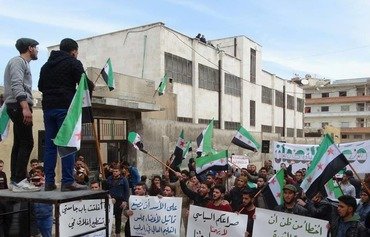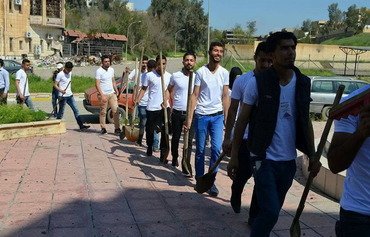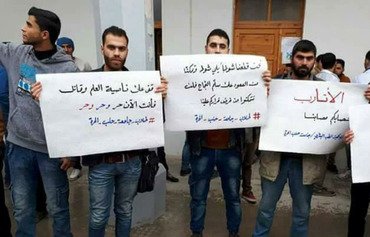The University of Kobani's first academic year is now in full swing, following its official inauguration on December 10th as the region's first university.
Students and their parents have welcomed the university, as pursuing higher education no longer means they must travel to other areas to study, which had placed a heavy burden on families in and around the city.
The university, which offers higher education free of charge, initially opened with two faculties, with other faculties and departments slated to be opened next year, university co-chair Kamal Bisrawi told Diyaruna.
Plans to open the University of Kobani were announced at a large official ceremony at the end of September, with registration opening October 10th.
![The University of Kobani, which officially opened December 10th, has two faculties at present and plans to add more in the coming academic year. [Photo courtesy of Saleh Muslim]](/cnmi_di/images/2017/12/28/10807-koban-uni-syria-600_384.jpg)
The University of Kobani, which officially opened December 10th, has two faculties at present and plans to add more in the coming academic year. [Photo courtesy of Saleh Muslim]
The registration process was extended for some time, Bisrawi said, to allow the largest possible number of students to register for the current academic year, with 45 students currently enrolled in the two faculties.
"This number is expected to increase significantly in the coming year, as the university is still new, and most students who finished high school this year had already enrolled in other universities," he said.
Science and language faculties
The university currently has two faculties -- basic sciences and languages -- but preparations are under way to open new faculties and departments.
Demand for admission to the sciences faculty has been higher, Bisrawi said, noting that the faculty consists of three departments: physics, chemistry and mathematics.
The faculty of languages so far has just one department, of Kurdish Language and Literature, he added.
"The university is multi-lingual, with Arabic, Kurdish, English and other languages spoken," he said, "and the matter is left to the professors and the students to agree on a language to be used for instruction."
There are 13 professors, most of whom hold master's and doctoral degrees.
As for the adopted curricula, Bisrawi said, the university uses a variety of sources and considers both Arab and foreign sources to select the curricula suitable for the various departments.
Challenges to be overcome
"The challenges the university faces mirror those facing the city of Kobani, namely Syria's civil war and related events," Bisrawi said.
"This particularly pertains to the teaching staff, as there is a limited number of areas of specialisations and specialised professors," he said.
However, this issue is being gradually overcome in order to offer all required disciplines, he added, noting that funding for the university is provided by the education committee of the autonomous administration of the Euphrates region.
University student Avin Atto told Diyaruna the establishment of a university in Kobani was one of the best things to happen for her and other local students.
"In the past, university education was a nightmare for everyone, as students had to travel to other provinces or outside the country," she said.
Even in northern Syria, the closest universities are in Afrin and al-Jazira region, which incurred transportation and accommodation expenses in addition to tuition, she said, exceeding many students’ ability to pay.
Education 'easy and available'
University education is now "easy and available to everyone", Atto said, adding that "the situation at the university is excellent and administrative staff, faculty and students are working to ensure the first academic year is a success".
Kobani resident Saleh Abdo, a father of two, told Diyaruna the opening of the University of Kobani has lifted a huge burden off his shoulders.
His children will be able to further their education, which they almost had to forego due to the cost of moving to other areas and other related expenses, he said, adding that many families also were impacted by the recent circumstances.
These include the presence of the "Islamic State of Iraq and Syria" (ISIS) in the area around Kobani and the ongoing war in Syria, which has made sending students away to pursue their university education a very difficult proposition.
"Now, education offered free of charge has made it accessible to all without exception," Abdo said, noting that the university will help to stem the migration of youth to other areas, which has been a problem for Kobani.

![Faculty, students and officials attend the University of Kobani's official opening ceremony on December 10th. [Photo courtesy of Saleh Muslim]](/cnmi_di/images/2017/12/28/10806-syria-kobani-uni-600_384.jpg)






